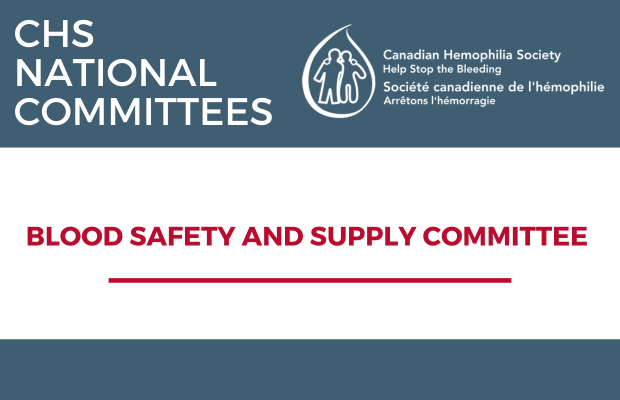CHS national committees – What do they do? What are they?

You have heard us say it, you have read about it: we are deeply grateful for the work and time and dedication of our volunteers …
But have you ever wondered what CHS volunteers do?
Our volunteers sit on a number of committees dealing with all the issues that characterize the CHS: governance, finance and administration, blood safety, volunteer recognition, chapter collaboration, international projects, care and treatment, scholarships, bursaries, fellowships and research grants for Canadian researchers.
All this requires committed volunteers whose expertise and knowledge are put to good use in presenting the Board of Directors with clear and relevant recommendations.
We would like to draw attention to these volunteers by describing the national committees they sit on, and the direct and indirect impact they have on your life.
To mark National Volunteer Week, we are therefore launching a series of articles introducing you to the committees that stimulate critical thinking, take important and sometimes difficult decisions and make recommendations– in short, the soul of the CHS. Who knows, you may find that you would be a good fit for one of those committees!
We are pleased to introduce you to the first committee, and perhaps historically one of the most important: the Blood Safety and Supply Committee.
BLOOD SAFETY AND SUPPLY COMMITTEE
The purpose of the CHS Blood Safety and Supply Committee (BSSC) is to be kept abreast of the latest research and scientific developments in blood, blood products and their alternatives, factor replacement therapy for hemophilia, von Willebrand disease and related bleeding disorders, emerging pathogens and transfusion safety measures, new ways of delivering factor therapy, gene therapy. The BSSC is concerned with the safety, supply and accessibility as they relate to blood, blood products and their alternatives.
The responsibilities of the committee are to:
- Follow the most recent scientific
- Keep abreast of policies adopted by Canadian and international regulators, blood agencies and
- Send representatives to attend national and international meetings and conferences related to its
- Address concerns raised by members of the bleeding disorders community related to its
- Communicate with the bleeding disorders community to keep it informed on important issues.
- Participate in community advisory committees related to Canada’s blood
- Maintain channels of communication with other stakeholders (CHS health care providers, Canadian Blood Services [CBS], Héma-Québec, provincial blood advisory committees, Health Canada’s health products and food branches, other national and international bleeding disorder associations, pharmaceutical companies active in the Canadian market).
- Provide advice to the Board of Directors and CHS staff in the event of an emergency (emergency pathogen, recall or withdrawal of blood products, shortage, threat to accessibility…).
- Produce an Annual Report on blood safety, supply and accessibility.
The members of the committee are appointed by the chairperson and consist of members who have:
- the ability to understand the medical, scientific and political issues related to the mandate of the committee;
- the knowledge of issues related to the mandate of the BSSC, and the Canadian blood system;
- the ability to communicate with members of the committee and with the wider community;
- the ability to represent the committee at meetings and conferences and on community advisory
Like any other CHS national committee, in choosing members, consideration is also given to geographical representation, representation of different medical conditions (factor VIII, factor IX, VWD, other coagulation disorders, hemophilia in children, other medical conditions requiring blood or blood products…) and representation from interested medical specialties (nursing, physicians…)
The term of appointment for members is two years and members are eligible for re-appointment.
Current members of the BSSC are:

“My decision to join the BSSC was initially fueled by a desire to understand the complexities of the national blood supply system. However, my continued involvement stems from a deep appreciation for the committee’s unwavering dedication to enhancing care for individuals with bleeding disorders. I value the committee’s commitment to making a difference, even if their efforts are not always loudly celebrated. I admire the group’s steadfast dedication to advocating for improved care and access to resources, recognizing the profound impact these efforts have on the bleeding disorder community. I continue to be on the BSSC in an effort to share any provincial changes in care, policy, or proactive measures. I am committed to supporting the committee in whatever way I can, leveraging my work to contribute to the mission of enhancing care for individuals with bleeding disorders.
The BSSC works behind the scenes, tirelessly advocating with provinces to enhance access to treatment and care for individuals with bleeding disorders.
Being part of the BSSC offers a unique opportunity to contribute to the bleeding disorder community by staying informed about current events, products and pipeline products, advocating for improved access, and shaping policies that directly impact patient care. It’s a chance to be proactive and make a meaningful difference in the lives of individuals with bleeding disorders.” – Sarah Crymble
“It has been a pleasure working with the BSSC for the past five years during which I have had the opportunity to meet many talented and dedicated people. It has been rewarding to see that our advocacy efforts actually make an impact and can influence our stakeholders. We have an amazing team of health care professionals and people with bleeding disorders that makes this an effective committee. Through reading the latest research, attending conferences, and participating in workshops, I have learned a wealth of information about blood safety and supply. There are more layers of complexity and nuance than I initially thought.” – Cleaven Pagani
“I joined the BSSC in the early 1990s because I wanted to help support the advocacy for safety of our products and try to influence what products we may have access to. As the committee chair for over a decade, I have influenced and lead our strategy with the support of the whole committee resulting in many positive decisions by the provinces that made products available to patients. Among other accomplishments, the committee has influenced provincial governments’ decisions so that patients have access to a choice of products. It has had influence on policy decisions such as donor deferral (MSM) and paid plasma as both are very important issues that our involvement had significant influence on.
The CHS with the BSSC has built significant respect with Canadian Blood Services as well as with many ministries of health; our voice matters and does influence decisions. Beyond policy decisions, the committee’s work has resulted in the provinces agreeing to make available extended half-life products and, to most recently, making Hemlibra available. We continue to push the provinces to make Hemlibra available to those individuals with a severe phenotype, but do not meet the less than 1% criteria. We have also been actively involved in the health technology submissions for various products including gene therapy.
In reflecting on the greatest achievements of the BSSC, I have to say that some successes were directly the result of the committee, while significant achievements were a community effort. Each of the committee achievements likely would not have been accomplished without the active engagement by parents, and individuals with a bleeding disorder who read our recommendations, used our letter templates and acted upon our request for help – resulting in hundreds of letters being sent to members of parliament, ministers of health and premiers.
If you are interested in reading and understanding scientific papers, interested in government policy decision making and want to participate with the aim of hopefully influencing product access and safety issues then this committee may be of interest to you.” – Craig Upshaw
“I decided to sit on the BSSC because I think the CHS needs to continue to advocate for a safe and secure blood supply. While much of our treatment has moved into the recombinant and pharmaceutical realm, advocating for equitable access to safe and effective treatment options – which in some cases still rely on donated blood or blood products – on behalf of all Canadians with inherited bleeding disorders continues to be part of the BSSC’s work. I believe this to be one of the CHS’ most important undertakings.
To be honest, I do a lot of learning at the BSSC. Much of the literature that is shared in advance of our meetings contains information that is new to me and informs and evolves my perspective of our bleeding disorders treatment landscape in Canada (and the world). When we discuss treatments and issues, I consciously remain open-minded, but tend to take a conservative/hesitant stance on new developments. I crave data when making decisions, so I rely on our pre-readings to inform my stance. When I don’t feel I have enough information to make an informed decision, I push back.
The legacy of the tainted blood tragedy is very much still felt within our Canadian bleeding disorders community. I believe that a large part of our membership, as well as a large part of the broader Canadian patient population, expect the CHS to continue to be an active ‘watchdog’ of the blood supply and treatment landscape. The CHS accomplishes this through the work of the BSSC.
Much of the CHS’ treatment-related advocacy communication is either informed by – or comes directly from – the BSSC. An example from a couple of years ago is the advocacy campaign the CHS undertook for the approval of emicizumab. Many of the initial pushes to that end came from the BSSC, and efforts continue at the BSSC to broaden access to this incredibly impactful treatment. Recently, much of the BSSC’s focus has been on gene therapy, and simultaneously advocating for approval and access to novel gene therapies, while also ensuring that Canadian patients have balanced, well-rounded, and as comprehensive as possible information regarding these treatments so they can make the best and most informed decisions regarding these treatments for themselves.
I think the BSSC’s presence (on behalf of the CHS) on various other agency committees (e.g.: CBS) or the ability of the BSSC to get the attention of appropriate government officials/ministers is commendable. The CHS’ voice is communicated quite broadly through the outreach efforts undertaken by the BSSC, and this can be quite impactful.
I would encourage anyone interested in joining the BSSC to reach out to an existing committee member, or to David Page. The committee’s communication can get quite dense at times, and a basic understanding of different treatment modalities (and maybe even some biochemistry) would be very beneficial (though not a strict requirement) for a prospective committee member to feel comfortable engaging in the committee’s debates. That being said, I find the discussions at the BSSC to be incredibly informative and relevant, especially given the rapid advances in treatment we have seen over the last five or so years. I’m honoured to be a part of such an important CHS committee.” – Emil Wijnker




